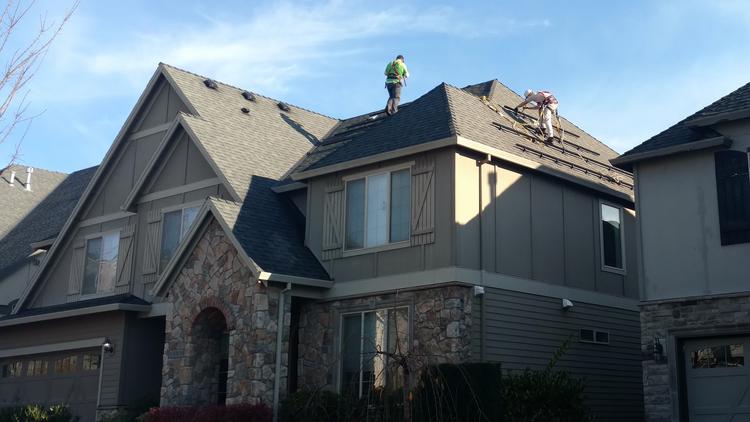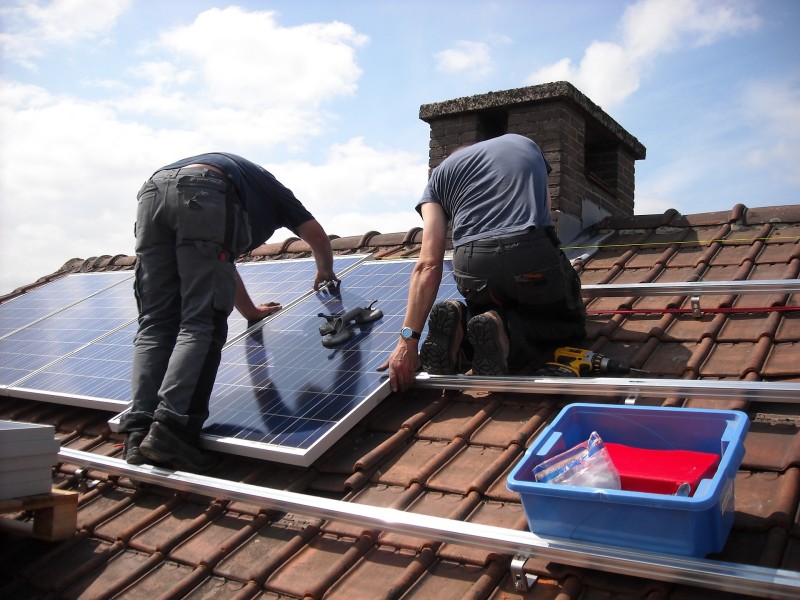Nevada Legislature Passes Bill to Restore Net Metering for Rooftop Solar
The legislation is on track to become law, which advocates say will reboot the state’s rooftop solar market. Tesla is already planning to enter.
June 05, 2017
The Nevada State Legislature has passed a bill that's expected to revive the state's ailing rooftop solar market. The Assembly voted to approve a Senate version of the bill late Sunday night, with just a day remaining in the legislative session.
The bill (AB 405) would reinstate net energy metering for residential solar projects, but at a discounted compensation rate.
AB 405 would immediately allow rooftop solar customers to be reimbursed for excess generation from a solar system at 95 percent of the retail electricity rate. Over time, though, customer compensation would decline. The amended bill would create tiers, where credit rates decrease in increments for every 80 megawatts of rooftop solar generation deployed -- to a floor of 75 percent of the retail rate. A previous version of the bill lowered compensation in increments based on peak load.
If signed into law, AB 405 would also allow net-metered customers to lock in their rate for at least 20 years, eliminating the risk that rates could change retroactively. Other consumer protections are also included in the bill, like the requirement for solar companies to offer a 10-year warranty and to provide transparent information as to how they calculate customer savings.
Furthermore, the legislation ensures that net metering will remain the law of the land in the event Nevada voters decide to deregulate the state's electricity market. It also mandates that residential solar and energy storage customers cannot be treated as a separate rate class, which means these customers cannot be hit with higher fees for investing in distributed energy.
Governor Brian Sandoval has 10 days to sign the bill. If signed, the net metering compensation changes would take effect right away, and the consumer protection measures would take effect this fall.
Rooftop solar advocates, including the Solar Energy Industries Association (SEIA), say the bill will reboot Nevada's rooftop solar market, which has been effectively stalled since a 2015 policy change.
"This bill is a compromise that doesn't fully value the benefits of distributed solar," said Sean Gallagher, SEIA's vice president of state affairs, in a statement. "It will, however, allow Nevada consumers and small businesses that may have wanted to go solar, but found it uneconomic under the existing solar policies, to now proceed."
"The legislation also provides important consumer protections, ensuring that solar customers aren't placed in discriminatory rate classes and giving customers 20 years of certainty when they sign up to go solar," he added. "We believe that it will be able to get solar companies back to business in Nevada, creating jobs and investment."
A Tesla spokesperson said the company will begin selling rooftop solar and residential storage products in Nevada as soon as possible, adding,"We look forward to bringing even more jobs to the state in the years ahead to help provide residents with affordable rooftop solar and energy storage choices.”
Changes in the legislation come nearly a year and a half after the Public Utilities Commission of Nevada (PUCN) voted to eliminate retail-rate net metering for new and existing solar customers in December 2015. State regulators originally planned to phase out net metering over four years, but later extended the timeline to 12 years. Amid ongoing public opposition, the PUCN decided to grandfather existing solar customers onto their previous rates, but did not address the market for new solar customers.
Nevada lost more than 2,600 jobs after regulators eliminated net metering in late 2015. Major solar firms pulled out of the state, unable to find a way to make their systems pencil out economically for consumers.
“This is a victory hard won and a testament to the overwhelming support for rooftop solar in Nevada," said Alex McDonough, Sunrun’s vice president of public policy. "Nevadans have made it clear they want the right to generate their own clean energy and they want the good jobs and clean air that go hand in hand with a thriving solar market. [...] We look forward to Governor Sandoval signing AB 405 into law and appreciate his leadership in bringing rooftop solar back to Nevada.”
NV Energy, meanwhile, contends that restoring net metering would be very costly. The utility gave a presentation to the Senate last month that forecast AB 405 would cost more than $63 million each year, or about $1.3 billion over two decades. These calculations were based on a earlier version of the bill, however -- not the bill that passed yesterday. Solar advocates also pointed out that the utility did not account for any of the costs of transmission and distribution for utility-scale solar or the benefits of rooftop solar.
The Nevada State Assembly passed an earlier version of AB 405 in a vote of 38-2 in late May. The Senate version passed Sunday was approved by the Assembly late Sunday night. The bill now heads to the desk of Governor Sandoval, who is likely to sign it. Sandoval put together an energy task force last year that recommended restoring net metering in 2017.
This story was updated on Monday, June 5 to reflect that the bill passed in both the Senate and the Assembly, and to include additional information on the bill.












